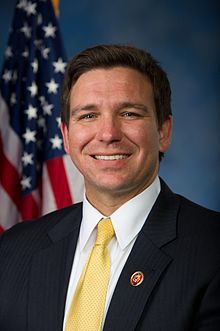Last week, in the community of Brandon, Florida, Governor Ron De Santis summarized the vision of governance that should be the model for all aspiring and current conservative lawmakers.
(A full transcript can be seen here and the quote in question comes around the 39:00 mark.)
When asked why he stepped in to prevent Florida localities from enacting mask mandates or the federal government from enforcing vaccine mandates, the reply was concisely precise: “You don’t have the right to do wrong.” Bingo. Government has a role in our lives – and it is to protect us from one another but also, paradoxically, the state itself. No more, no less.
This comment stands in stark contrast to the once-rising Kristi Noem, who in August defended her position of allowing private businesses to mandate the vaccine. This came after her decision to defend delusions of the mentally ill, which indirectly meant the rest of the truth-loving public would have to honor their alternate realities as well.
Noem’s response to the vaccine mandate was that the government didn’t need to interfere in the private workforce. The obvious question to her sudden concern over laissez-faire politicking is: Since when?
The fact is that the government does have a role to play in society. As stated in the Declaration of Independence, the state exists to preserve the rights of people – inherent and God-given rights such as life, liberty, and property: “That to secure these rights, Governments are instituted among Men, deriving their just powers from the consent of the governed.”
It shouldn’t have to be said, but we need the government to perform that significant role. The absence of social organization is a return to incipient homo sapien culture. Is Somalia better off without a government by the people, of the people, and for the people? We need some government.
Read more from Parker on GraniteGrok.com
The confused libertarian wing of the conservative movement pushes back against this notion and says the state has absolutely no place in a person’s life. Of course, this movement is mostly composed of younger, able-bodied men (I say that not based on empirical data but rather anecdotal and observational data – nonetheless I think I am right about this).
Of no apparent concern to fully committed ideologues of the libertarian religion – yes, it is a religion of amorality – is that not every person has the resources, means, wherewithal, or desire to perform the tasks necessary in a total vacuum of government service.
Do we all handle firearms and act as our own police? Can we even all afford firearms? Should we all be obligated to focus on self-preservation instead of self-actualization? Do we exist in a free market world where, for example, grotesque child labor is tolerated?
If public schools were suddenly banned and no vouchers offered instead, how would the poor, stupid, or injured send their kids to a private institution of learning to be given a fair chance in the world as an adult themselves?
Without a moral guide or common bond, what principles unite and protect us from one another?
All conservatives should have a libertarian bent, but at a certain point, libertarianism sacrifices moral absolutes in favor of an unflinching idealism matched only by leftism. It is certainly as dangerous and chaotic.
With that in mind, then, De Santis captures the essence of a limited and moral government’s role in a person’s life and society’s existence. If the government is to protect the universal rights of the individual and maintain an advanced civilization, then it must recognize basic universal truths of right and wrong, moral and immoral, and good and evil.
A line in the sand at mandates, whether from an overbearing federal government or a small municipality, does indeed protect the rights of the individual and maintain freedom in a society. This is where “you don’t have the right to do wrong” comes into play.
As with all issues involving conservative pushback, it is frustrating to observe how the catalyst for the debate is demanded to be held as true and the observation of the catalyst is deemed to be overreach, intrusion, or hostility.
The left forces gender theory malarkey with all of its concomitant pronoun usage and critical race theory hatred in school, for example. Spreading outright lies and enforcing groupthink is seen as okay; the only problem is when a concerned student, parent, or politician speaks out.
Translation: Only one set of ideas are valid. Is this really freedom? Is this the type of society we want?
In the same vein, a school mask mandate is tolerated but a mandate against masks is seen as government intrusion. Similarly, in the world of the Kristi Noem, somehow a mandate on vaccines (which exists only because government bureaucracies have lied for two years about Covid) is acceptable but a mandate against vaccines is seen as too much government involvement. Again, which action steals freedom and which expands it?
These rhetorical questions serve as a simple litmus test.
In the era of Covid, we have seen where unchecked government power can run amok. Parts of Australia and Europe – formerly free realms in the traditions of Western Civilization – are entirely unrecognizable in their complete tyrannical overhaul. This is pure evil masquerading as public safety.
As De Santis has shown, however, there is room for reform within the conservative movement that can return our political power to the imagined world of the Founders.
This world consists of limited federal powers and delegation of authority to states and localities.
Democracy has been said to inevitably lead to totalitarianism. Perhaps this is true, but the failure of our great experiment will not be because of the envisioned framework for our governance, but because of evil actors who willfully ignore it.
Reposted with permission. If you’d like to read more from Parker Beauregard, please visit The Blue State Conservative.





